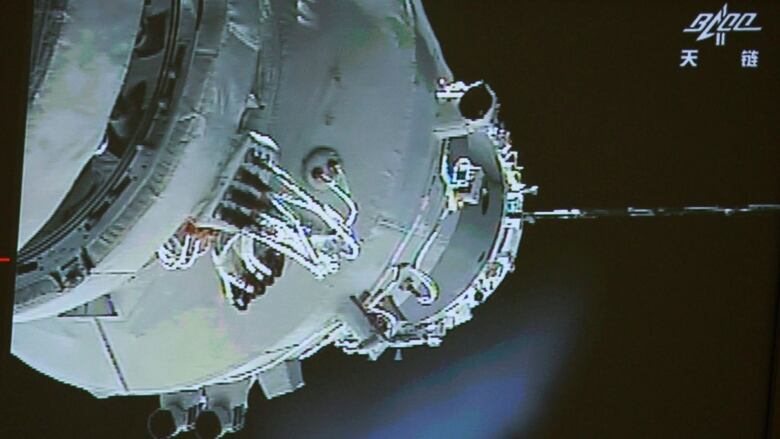Disabled Chinese space lab likely to crash to Earth in coming months
8-tonne Tiangong-1 not expected to pose threat when it re-enters Earths atmosphere between now and April

A defunct, yacht-sized Chinese space lab is expected to fall out of orbit and crash to Earth in the coming months.
China launched the eight-tonne Tiangong-1 satellite in 2011. Tiangong means "Heavenly Palace" in Chinese.The satellite, which is 12 metres long and 3.3 metres in diameter,was designed to test technology for a future space station. The Chinese space program used it for a series of spacecraft docking tests and visits from astronauts.
The space lab broke down and stoppedfunctioning in March 2016. That means China's space agency no longer has control of it.
Chinese officials told the UN secretary general in May 2017 that Tiangong-1 was expected to re-enter Earth's atmosphere between October 2017 and April 2018.
But as of Oct. 19, the satellite was still orbiting at an altitude of 305 kilometres above the surface and wasn't expected to come down immediately, according to the satellite tracking site SatFlare.
Low risk
When it does crash, China says the risk that it will cause any damage or injury to aircraft or people or things on the ground is "very low" since most of it will burn up in the atmosphere as it falls.
However, Jonathan McDowell, an astronomer at the Harvard-Smithsonian Centre for Astrophysics, told the Guardian last week that pieces of up to 100 kilograms could crash down on the Earth's surface. At that time, he said the satellite has begun dropping more quickly as it reaches denser parts of the Earth's atmosphere.
McDowell tweeted that the satellite is similar in size to other objects that fell to Earth from orbit in 2012and 2015 and just a fraction of the size of NASA's 77-tonne Skylab space station, which went down in 1979.
I think it's probably a good thing that we avoid uncontrolled reentry of 50-tonne vehicles nowadays....
—@planet4589Russia's Mir space station, was about 130 tonnes when it deorbited in 2001. The wreckage of both Skylab and Mir fell far from populated areas.
As for Tiangong-1's descent, McDowell isn't worried about it.
"But deorbiting it under control would certainly have been 'best practice,'" he tweeted.
Last uncontrolled reentries as massive as Tiangong were a Zenit second stage in 2015 and the Fobos-Grunt Mars probe in 2012 (*)
—@planet4589China said it would monitor Tiangong-1's descent and post its orbital status on the China Manned Space Agency website, but nothing has been posted on the website under "Tiangong-1orbital status" since July.
Once Chinahas the final forecast for the time and region of re-entry, it says it will issue an "early warning in a timely manner" and bring that to the attention of the United Nations Office for Outer Space Affairs and the secretary general of the United Nations.












_(720p).jpg)


 OFFICIAL HD MUSIC VIDEO.jpg)
.jpg)



























































































